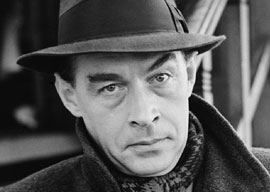
September 06, 2013

Erich Maria Remarque
I used to see him in El Morocco, the most famous nightclub of its era during the late 1950s and early 60s. He was a very handsome man, beautifully tailored and with impeccable old-fashioned manners, and a heavy drinker. Wine, champagne, and cognac were his drinks, and vodka later in the night. Although invited to sit in the owner’s table where only unaccompanied men were permitted, he was never without female company, and what beauties they were. I had made the cut early on but never had the luck to be at that particular table when he was there, and I was too shy back then to go up to him and introduce myself.
He was the author of Im Westen nichts Neues, known to the rest of the world as All Quiet on the Western Front. Erich Maria Remarque was a prolific novelist, a very rich man who collected impressionists and good art as obsessively as he collected women, a man who anti-Nazi writers such as Stefan Zweig and Thomas Mann snubbed, but one whose sister was beheaded by the Nazis because of her loyalty to him. Unlike the snubbers, Remarque had spent three years close to the front, had been wounded three times, and had heroically carried a comrade who was severely wounded to safety, only to discover his buddy was dead on arrival. His fictional hero, Paul Bäumer, does the same thing in All Quiet just before his own death.
I would bet my bottom dollar that neither George W. Bush, certainly not the lying war criminal Tony Blair, nor that Napoleon wannabe mini-buffoon Francois Hollande have read many war books written by those who saw combat up close. Maybe Obama has, that’s why he’s holding back, but I doubt it very much. Uncle Tom’s Cabin seems to be his Bible. When All Quiet came out in 1929, it ran to 43 separate printings, one and one half million copies sold in German alone, book-club editions in every country in the world, and translations in 39 languages, from Afrikaans to Zulu. (Isaac Bashevis Singer translated the Yiddish version). Soldiers from both sides said that the novel included absolutely everything that they had experienced out there. Perhaps that is why Zweig and Mann had not bothered to answer Remarque’s letters. They wrote fantasies; he wrote how it was. And even back then winners were not appreciated, especially handsome rich winners who had beautiful women at their beck and call.
Remarque fled the Nazis in 1933, becoming a haunted, restless, exiled novelist, playwright, and screenwriter until his death in 1970 at age 72. Although married to Jutta, whom he left very comfortably off, he had a string of mistresses for whom today’s lowlifes would sell Aladdin’s lamp. I’ll drop just a few of them: Greta Garbo, Lupe Velez, Marlene Dietrich, Clare Boothe Luce, Sylvia Ashley Fairbanks, Dolores del Rio, Greer Garson, and countless others whose names now don’t mean a thing but were beauties of the time. Wow!
He somehow found the time to write Arch of Triumph, A Time to Love and a Time to Die, Black Obelisk, Spark of Life, and many others while seducing Paulette Goddard, whom he eventually married and who became his widow. Remarque remained tortured, prolific, and a womanizer all his life, the way writers should be but seldom are. (Today’s American and British writers are neurotic Boy Scouts by comparison, navel-gazing narcissists scribbling about body fluids and self-abuse.)